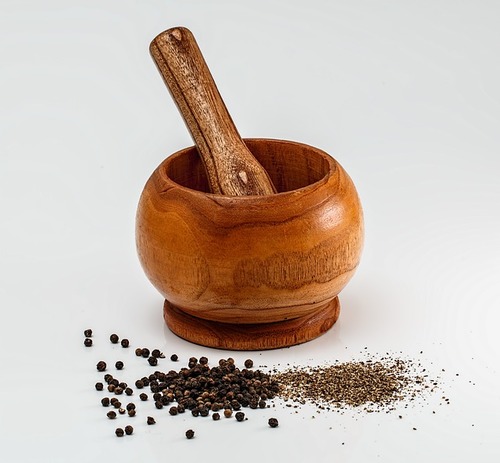Is Pepper Bad For You?
Also Known As: black pepper, peppercorn
Short answer
Except for possibly making you sneeze, black pepper is full of health benefits. It is one condiment that is, in fact, a good addition to the pantry.
Recommended Alternative
Very healthy and numerous health benefits. A few harmful qualities may be associated, but only under certain circumstances such as an allergic reaction.
View Full Grading System
Category 'A'
Very healthy and numerous health benefits. Side effects are rare. Things rated an 'A+' are typically necessary for survival (for example, water).
Very healthy and numerous health benefits. A few harmful qualities may be associated, but only under certain circumstances such as an allergic reaction.
Very healthy and numerous health benefits. Harmful qualities may be associated, but aren't usually serious.
It is important to note that even the best things in life can become bad in immoderate amounts. So, although something may be rated an 'A+', overconsumption/overdoing can bring unwanted effects.
Category 'B'
Very beneficial to your health. Things rated a 'B+' may have a few harmful qualities to pay attention to.
Overall beneficial to your health. Things rated a 'B' may have some harmful qualities to pay attention to.
More beneficial to your health than not. However, harmful qualities are most likely associated and shouldn't be overlooked.
The main difference between category 'A' and category 'B' is the harmful qualities typically present in 'B' items. Serious side effects are usually uncommon, but are still possible and should be taken note of.
Category 'C'
Both beneficial and harmful qualities associated. Things rated a 'C+' are typically a bit more on the beneficial side. Still, moderation is important.
A fairly even ratio of beneficial and harmful qualities. Moderation is important. Very general topics that can lean towards both sides of the spectrum will be placed here as well. Rice, for example, can be good or bad depending on the type.
More harmful than beneficial. Side effects are common, especially when consumed/done excessively. Moderation is very important.
Category 'C' usually denotes to both good and bad qualities. When it comes to this category, it is important to keep this word in mind: moderation.
Category 'D'
Harmful to your health. Although benefits may be associated, the bad most likely outweighs the good. Moderation is very important.
Harmful to your health. A few benefits may be associated, but the bad outweighs the good. Moderation is extremely important.
Harmful to your health. Very few, if any, benefits are present. Things in this category should be avoided as much as possible.
Category 'D' is typically for things that are more harmful than beneficial. While consuming/doing something unhealthy once in a blue moon shouldn't hurt, we definitely recommend eliminating 'D' items as a regular part of your routine/diet.
Category 'F'
Category 'F' is for things that fail to bring anything beneficial to the table, and are very harmful to your health. We recommend completely avoiding anything in this category. Long-term side effects of 'F' items are usually very serious.
Category 'N'
'N' stands for neutral. Things placed into this category are generally (a) neither good nor bad for you, or (b) lack the necessary evidence to reach any conclusions.
Long answer
When people think of spiciness, it may be the chillies used liberally in Thai and Indian cuisines and its capsaicin that comes most readily to mind. However, capsaicin isn't the only spicy chemical with a host of health benefits. Enter piperine, better known as the chemical responsible for the pungency of ground peppercorns, your everyday tabletop black pepper. Piperine has several health benefits, such as helping the liver with detoxification, aiding in the treatment of vitiligo by stimulating the skin to produce pigment, and assisting in the breakdown of fat cells.
Pepper improves digestion by alerting the stomach to produce hydrochloric acid. This improved digestion works to stave off problems such as constipation and diarrhea, as well as colic. Furthermore, a properly working digestive system reduces the risk of cancers of the colon and intestines as well as helping to rid the body of harmful LDL cholesterol.
Like capsaicin, piperine has the ability to help relieve symptoms arising from the common cold. Black pepper is also good in combating cough and other respiratory problems. This spice, native to the Kerala region in India, has also been linked to a reduced risk of dental disease and heart disease.
For most people, the only downside to black pepper is that it can - and often does - induce sneezing. It may also act as an intestinal irritant for those who have recently had abdominal surgery. With just 6 calories, only a trace amount of fat, and 3% of a person's daily fiber need per teaspoon, black pepper is a very healthy choice to add to any meal.
Possible short-term side effects
- sneezing
-
may irritate intestines in people with recent abdominal surgery
Benefits
- helps prevent heart disease
-
helps prevent gum disease
-
helps regulate digestion
-
may help cure vitiligo
-
reduces risk of atherosclerosis
-
reduces ldl cholesterol levels
-
promotes liver detoxification
-
promotes weight loss
-
helps to combat cough
Our Wellness Pick
(what is this?)
Simply Organic Black Pepper
- Medium ground texture
- Certified Organic
- Kosher certified
- Potent pepper taste
- Convenient jar form
Learn More!
Please turn your Ad Blocker off to see this content. Thank you!
Thank you for your feedback!
Written by Jeff Volling
Published on: 02-28-2016
Last updated: 12-15-2023
Thank you for your feedback!
Written by Jeff Volling
Published on: 02-28-2016
Last updated: 12-15-2023

 Approved by
Approved by 















